Understanding the Interplay of ADHD and Alcohol Use
The relationship between Attention Deficit Hyperactivity Disorder (ADHD) and alcohol consumption is intricate, spanning neurological, psychological, and social domains. Individuals with ADHD are at increased risk of developing alcohol use disorder (AUD), often engaging in early and heavy drinking behaviors. This article explores the nuances of this association, examining risks, effects, treatment options, and the scientific basis underlying the ADHD-alcohol connection.
Prevalence and Co-occurrence of ADHD and Alcohol Use Disorder
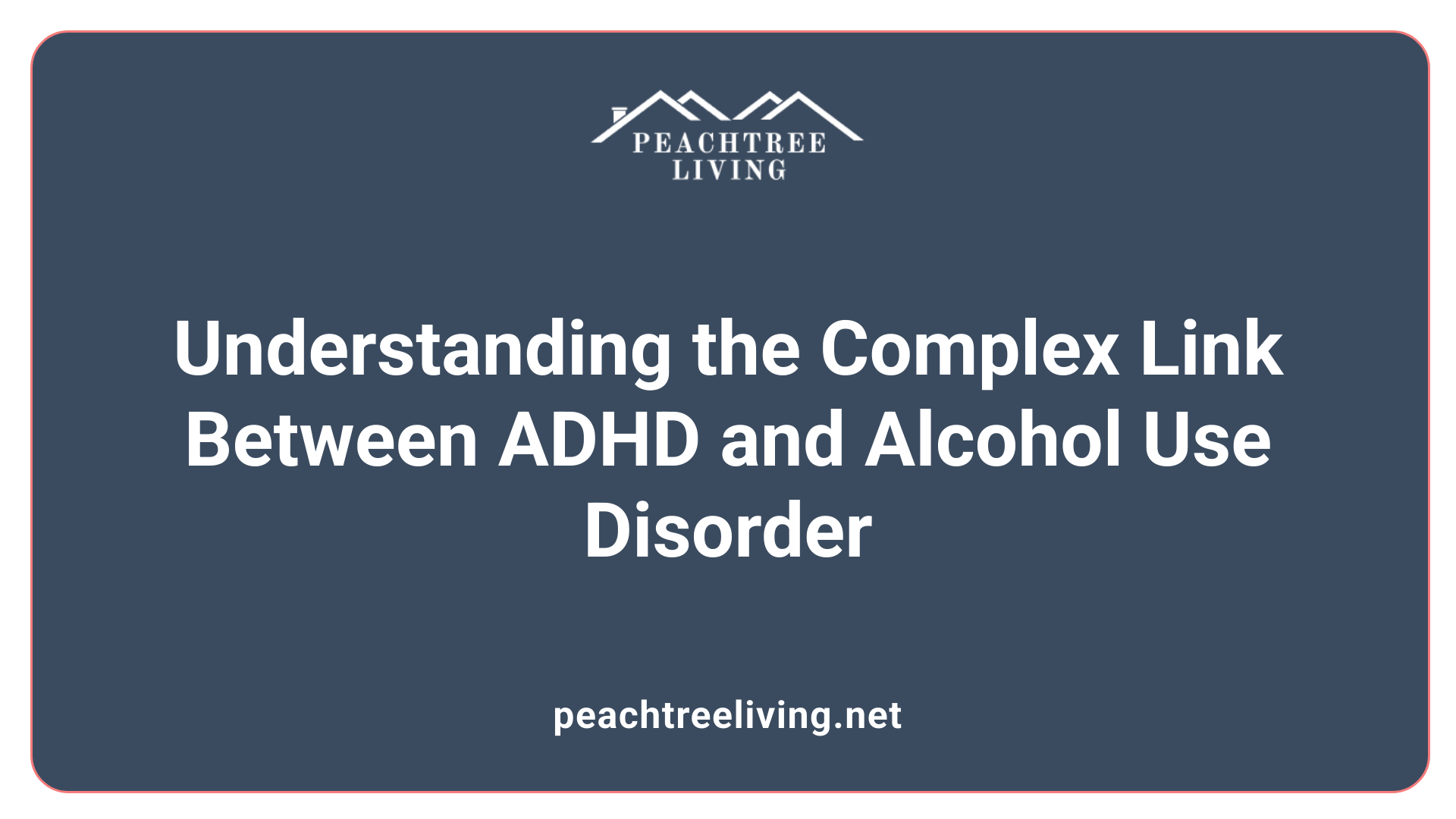
What is the co-occurrence of ADHD and alcohol use disorder?
ADHD frequently coexists with alcohol use disorder (AUD), forming a complex relationship that impacts treatment and outcomes. Studies indicate that up to 43% of individuals with ADHD may develop AUD at some point in their lives. Conversely, around 20% of adults receiving treatment for alcohol or substance use disorders are diagnosed with ADHD. This significant overlap suggests shared underlying factors.
Genetic predispositions play a crucial role in this connection. Research points to specific genes involved in neurotransmitter pathways, especially those regulating glutamatergic and catecholaminergic systems, that contribute to both ADHD and AUD. These genetic factors can affect dopamine regulation, which is central to motivation and reward, making individuals more susceptible to substance misuse.
Environmental influences further heighten this risk. Adverse childhood experiences, trauma, and prenatal exposure to alcohol or other substances are linked to increased likelihood of developing both ADHD and alcohol problems.
The symptoms of ADHD, such as impulsivity, difficulty focusing, and emotional dysregulation, often lead to maladaptive drinking patterns. Many individuals use alcohol as a form of self-medication to temporarily alleviate hyperactivity, restlessness, or anxiety. This pattern can reinforce alcohol misuse, worsening ADHD symptoms over time.
Effective management of concurrent ADHD and AUD requires an integrated approach. Proper diagnosis is essential, followed by a combination of medication, behavioral therapy, and support systems. Addressing both disorders simultaneously can improve treatment outcomes and reduce the cyclical nature of alcohol misuse and symptom exacerbation.
Risks and Behavioral Effects of Alcohol on Individuals with ADHD
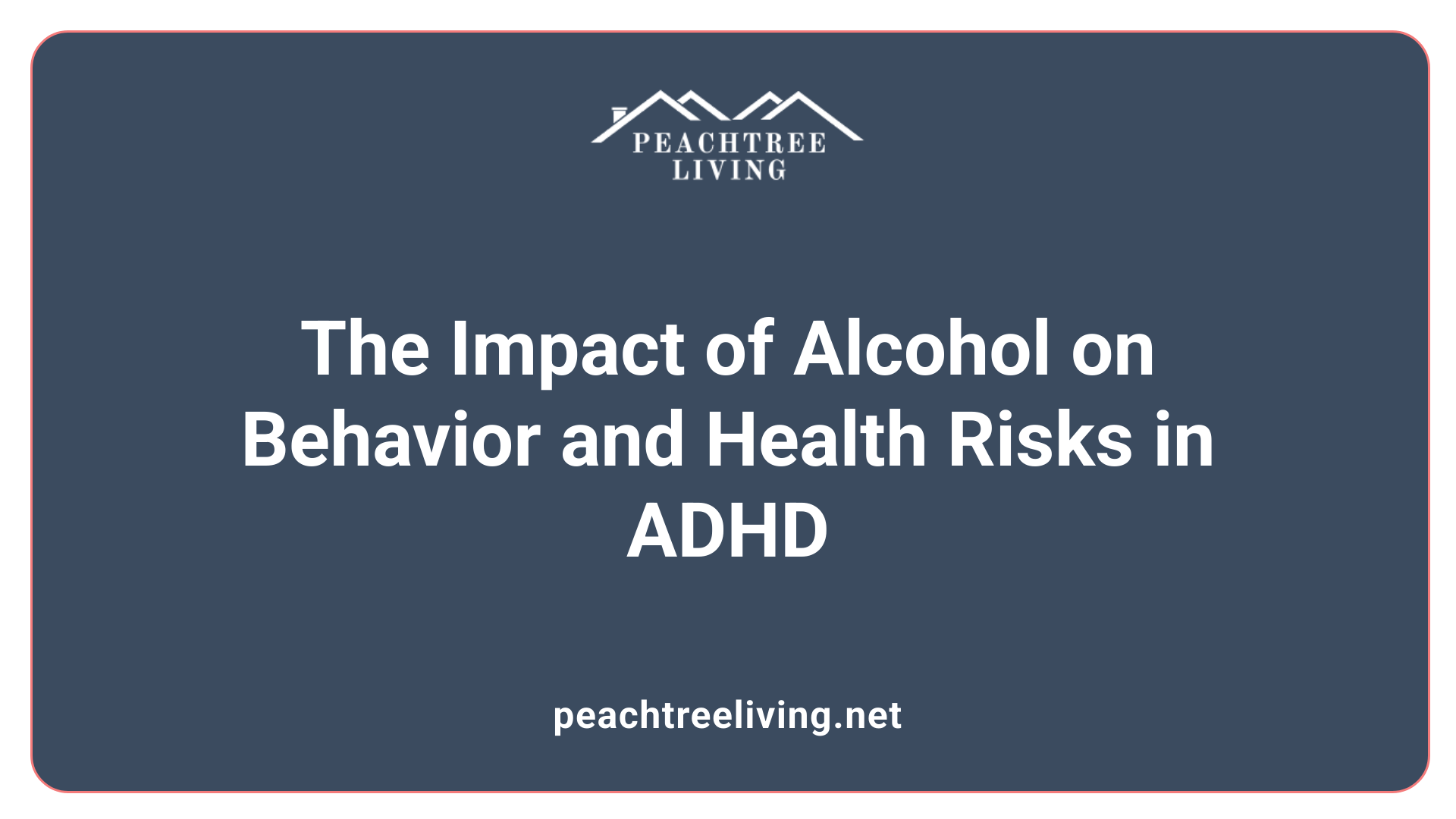
What are the risks and effects of alcohol use for individuals with ADHD?
Individuals with ADHD face a higher likelihood of developing alcohol use disorder (AUD) and often begin drinking at an earlier age. They may use alcohol as a form of self-medication to alleviate symptoms such as impulsivity, hyperactivity, and emotional dysregulation. However, this can lead to a cycle of dependence and worsening symptoms over time.
Alcohol worsens many core ADHD symptoms by impairing the brain's executive functions. It increases impulsivity, hampers decision-making, and impairs memory and focus. This is particularly problematic because the prefrontal cortex, the brain region responsible for these functions, is already less active in individuals with ADHD. Drinking alcohol can further delay its development and functionality.
When alcohol is combined with ADHD medications like stimulants, the risk of health complications rises sharply. These include increased blood pressure, irregular heart rhythms, dehydration, and even severe outcomes such as seizures. This interaction requires careful medical supervision.
Long-term alcohol use not only impacts mental health but also leads to physical health problems such as liver disease, neurological damage, and an increased risk of other substance dependencies. Furthermore, alcohol use can intensify emotional issues like depression and anxiety, which are commonly co-occurring conditions in people with ADHD.
In summary, alcohol poses significant immediate and long-term risks to individuals with ADHD. It can deepen existing behavioral problems, impair brain development, and increase the risk of serious health issues. Awareness and careful management are essential to mitigate these risks.
Neurological and Psychological Impact of Alcohol in ADHD
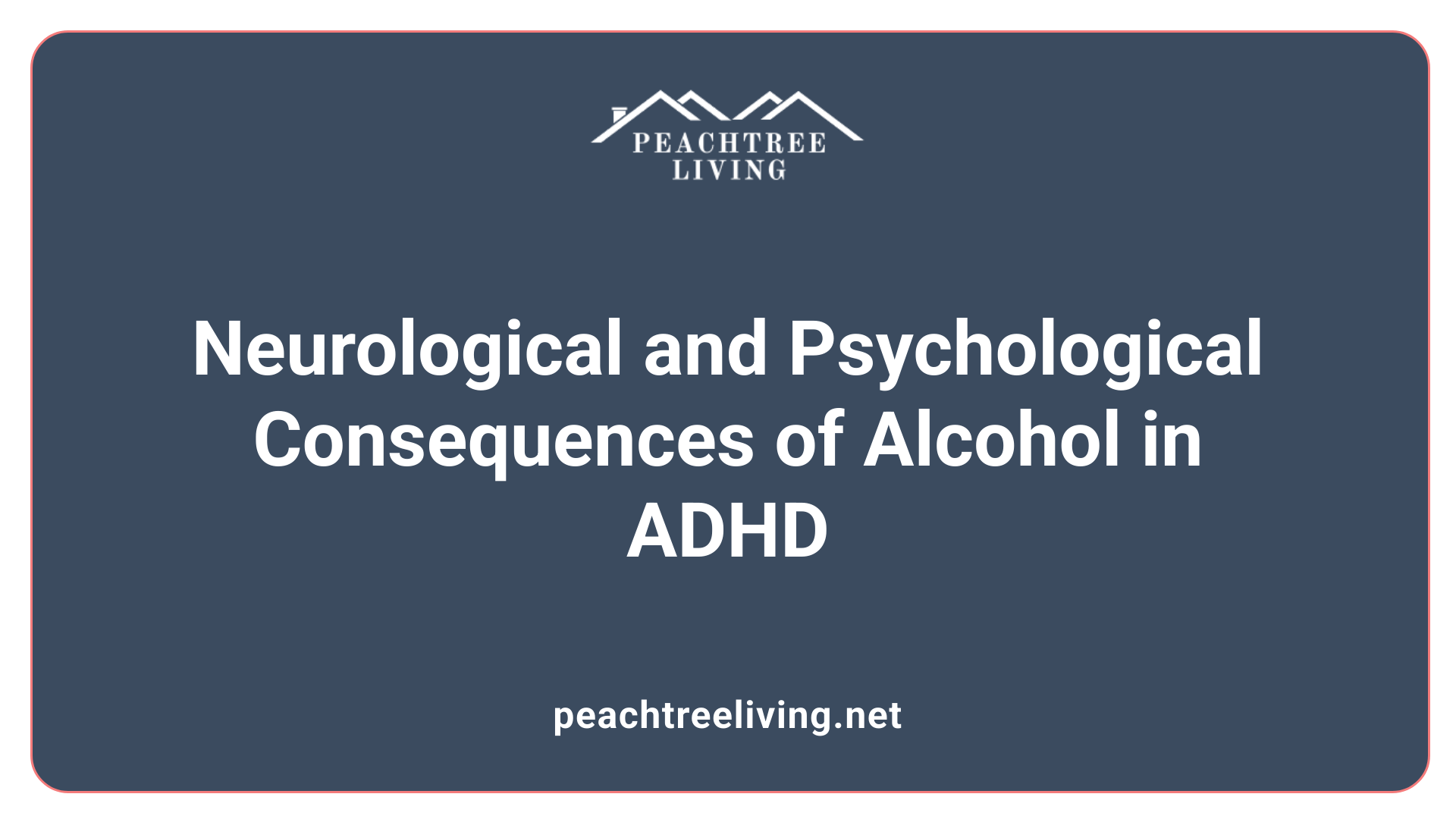
How does alcohol affect individuals with ADHD neurologically and psychologically?
Alcohol significantly influences the brain regions associated with ADHD, especially the prefrontal cortex, which governs impulse control, attention, and emotional regulation. In individuals with ADHD, this region is already less active, making them more vulnerable to alcohol's impairing effects. When alcohol is consumed, it temporarily boosts dopamine levels, giving a fleeting sense of relief from hyperactivity, impulsiveness, or racing thoughts. However, this temporary stimulation can accelerate impulsivity and risky behaviors, notably among teens and young adults.
Long-term alcohol use further destabilizes neurotransmitter systems, worsening executive functions such as planning, memory, and problem-solving. It can lead to increased difficulty maintaining attention and controlling impulses, which are core challenges in ADHD. Moreover, mixing alcohol with ADHD medications like stimulants diminishes medication effectiveness and heightens health risks, including heart issues and seizures.
Research shows that alcohol exacerbates ADHD symptoms rather than alleviating them, creating a cycle where individuals may rely on alcohol to cope, risking dependence and long-term brain damage. This combination of neurological impairment and psychological distress underscores the importance of careful treatment and management strategies for people with ADHD, especially concerning alcohol use.
Treatment Approaches for ADHD and Alcohol Use Disorder
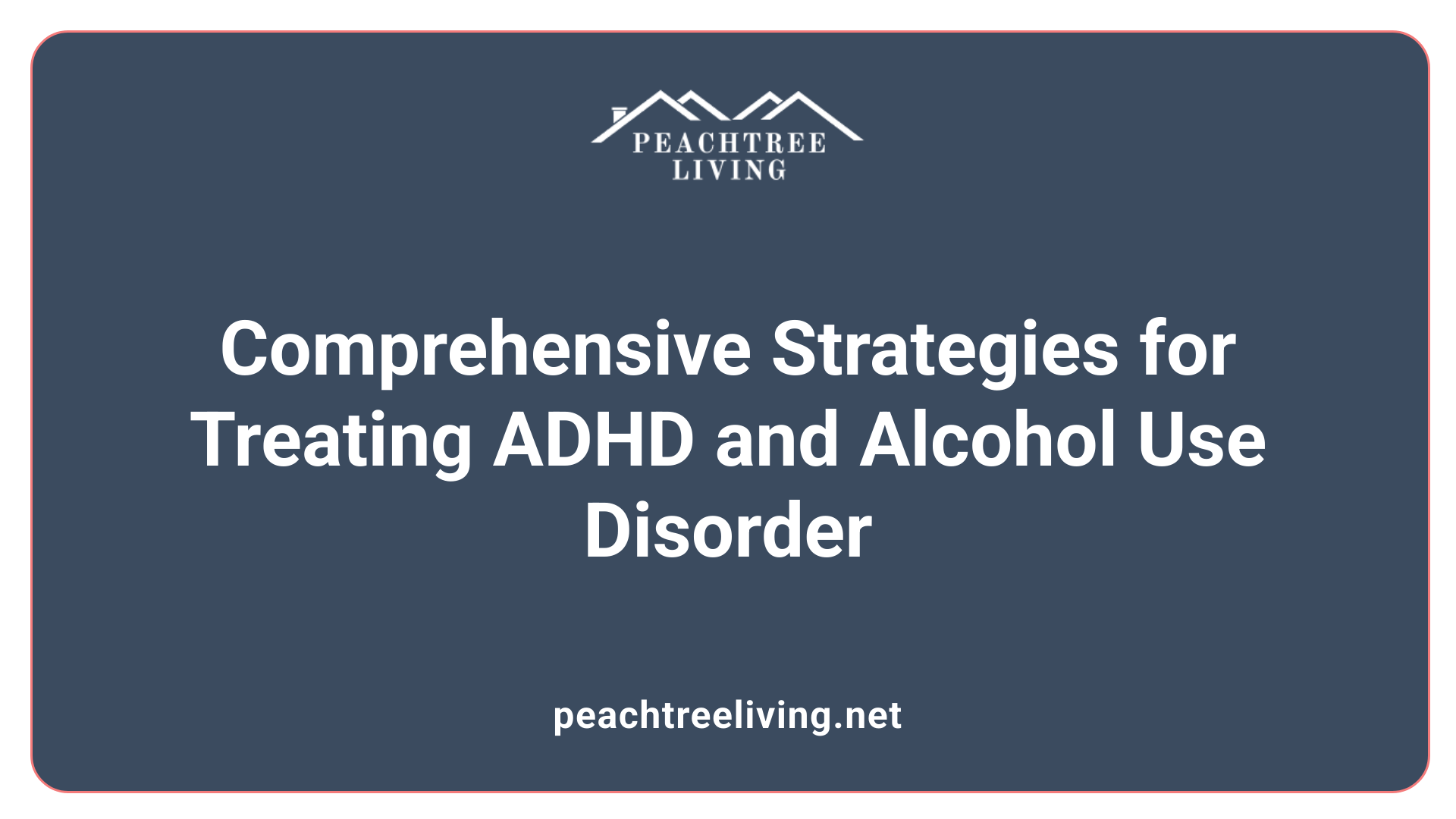
What treatment strategies are available for individuals with ADHD and alcohol use issues?
Managing co-occurring ADHD and alcohol use disorder (AUD) requires a comprehensive approach that addresses both conditions effectively. Pharmacological treatments include long-acting stimulant medications like methylphenidate or dexamphetamine, which can be prescribed carefully to minimize misuse risk. Non-stimulant options such as atomoxetine or guanfacine are also considered safer for those with AUD, provided they are monitored closely by healthcare professionals.
Psychosocial therapies play a vital role in supporting recovery. Cognitive-behavioral therapy (CBT) helps individuals develop healthier coping strategies, improve emotional regulation, and address impulsivity. Motivational interviewing can enhance motivation for change, while participation in support groups like Alcoholics Anonymous offers peer support and accountability.
Importantly, routine screening for ADHD in people with AUD can facilitate early diagnosis and treatment, even if the individual is still consuming alcohol. Coordinated and integrated care, involving addiction specialists, mental health providers, and primary care doctors, enhances treatment retention and reduces relapse risks.
Overall, a tailored treatment plan that combines medication, therapy, and ongoing support is essential for improving outcomes and managing the complex interplay between ADHD and alcohol use disorder.
Impact of Alcohol Abstinence on ADHD Symptoms
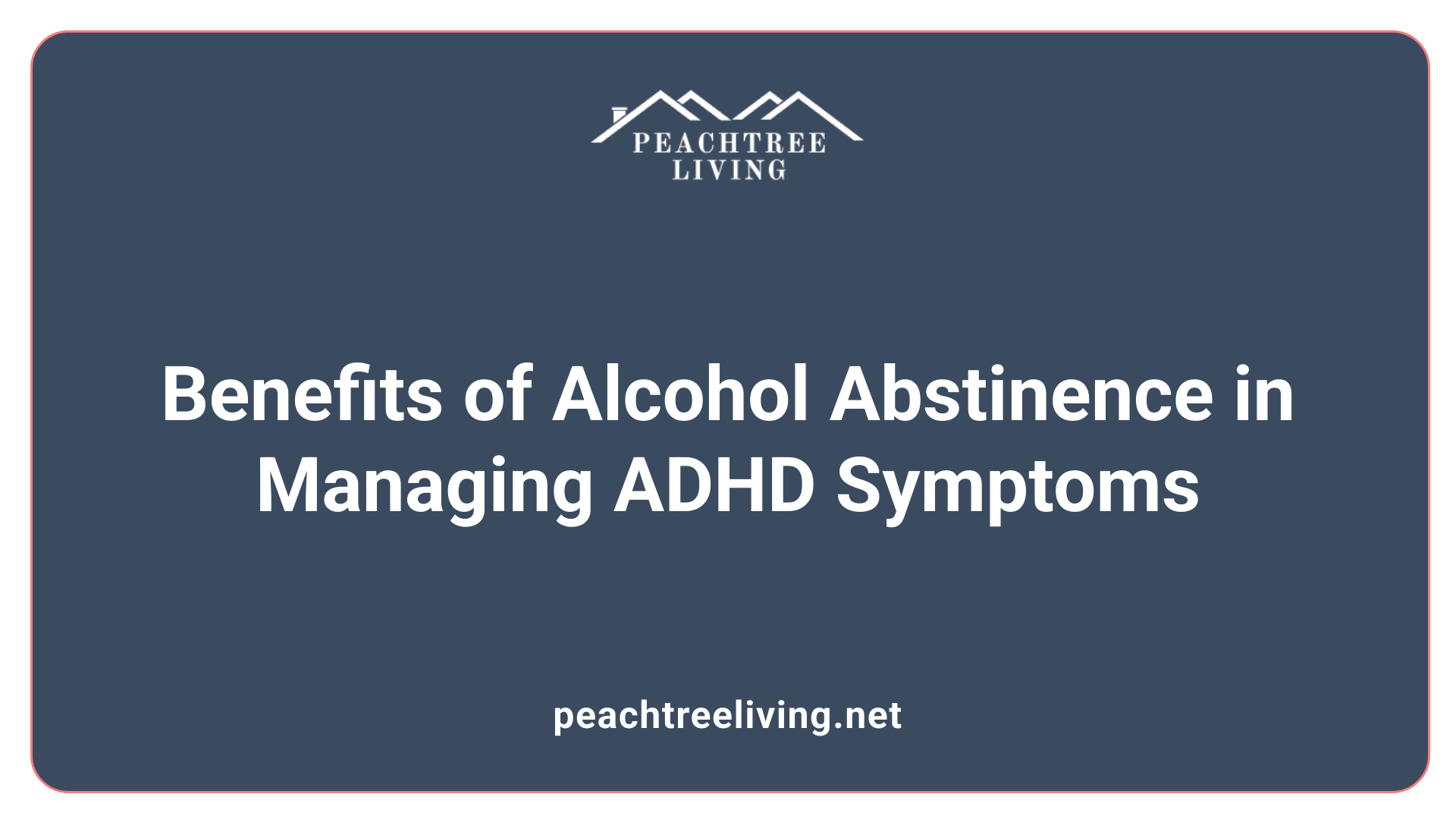
Does quitting alcohol improve ADHD symptoms?
Ceasing alcohol consumption can bring notable benefits for individuals with ADHD, especially when abstinence is sustained over time, such as a year or more. Alcohol negatively affects the prefrontal cortex—the area of the brain already underactive in those with ADHD—which worsens core symptoms like impulsivity, difficulty focusing, and hyperactivity.
Heavy drinking not only intensifies ADHD symptoms but also raises the likelihood of developing alcohol use disorder (AUD) and serious health issues including liver problems and neurological damage. Many with ADHD turn to alcohol as a way to self-medicate, temporarily calming hyperactivity and anxiety. However, this often leads to dependency, worsened mental health, and adverse interactions with ADHD medications.
Research shows that abstinence from alcohol can lead to improvements in brain function and a reduction in symptoms such as impulsivity and inattentiveness. It also decreases the risk of comorbid health problems, enhances emotional regulation, and promotes better sleep and overall functioning. These benefits highlight the importance of addressing alcohol use as part of comprehensive ADHD management.
Neuroplasticity and recovery of brain functions
The brain's ability to adapt—known as neuroplasticity—plays a crucial role in recovery after quitting alcohol. When the damaging effects of alcohol are removed, the brain can gradually heal, especially with supportive therapies and healthy lifestyle changes. Over time, this recovery can restore the balance of neurotransmitters like dopamine, which is often dysregulated in ADHD.
Improvements in neuroplasticity may result in better executive function, such as improved memory, decision-making, and impulse control. The strengthening of neural pathways supports long-term behavioral changes, reinforcing healthy coping mechanisms and reducing reliance on substances.
Behavioral and cognitive benefits
Abstaining from alcohol yields numerous behavioral enhancements. Individuals often experience increased mental clarity, better emotional regulation, and higher motivation levels. These changes can lead to improved academic or occupational performance, healthier relationships, and greater overall well-being.
Cognitive functions such as attention span, problem-solving, and organizational skills tend to improve, making daily tasks more manageable. Additionally, abstinence reduces the likelihood of mood swings, anxiety, and depression, which are commonly comorbid with ADHD and alcohol misuse.
Overall, quitting alcohol supports profound behavioral and cognitive recovery, fostering a more stable and functional life for those managing ADHD.
Interactions Between Alcohol and ADHD Medications
How does alcohol interact with ADHD medications?
Alcohol can have significant negative effects on individuals taking ADHD medications. Stimulant medications such as Adderall, Ritalin, and Vyvanse are designed to increase dopamine and norepinephrine in the brain, helping improve attention and reduce hyperactivity. When combined with alcohol, these medications can lead to increased side effects, including heart problems, dizziness, and impaired judgment.
Mixing alcohol with stimulants can mask the sedative effects of alcohol, leading individuals to consume more than they realize, which raises the risk of overdose and dangerous cardiovascular issues. Alcohol can also interfere with how these medications work, potentially making ADHD symptoms harder to control.
Non-stimulant medications like atomoxetine (Strattera) or guanfacine are generally considered safer. However, alcohol can still pose risks such as increased central nervous system depression and lowered blood pressure when combined with these drugs.
Monitoring and caution are essential. People with ADHD who drink alcohol while on medication should do so only under medical supervision. Healthcare providers can assess individual tolerance and help manage these risks.
Overall, the interaction between alcohol and ADHD medications can compromise treatment efficacy and increase health hazards. Awareness and careful management are vital to avoid adverse effects and promote safe treatment outcomes.
Alcohol’s Effect on Emotional Regulation and Life Quality in ADHD
How does alcohol consumption impact emotional regulation and quality of life in individuals with ADHD?
Alcohol consumption can significantly worsen emotional regulation difficulties faced by individuals with ADHD. People with ADHD often struggle with emotional dysregulation, impulsivity, and difficulty managing stress or negative feelings. When they consume alcohol, these issues tend to amplify, leading to increased emotional instability and impulsive behaviors.
Research shows that alcohol can impair the brain regions responsible for controlling emotions, particularly the prefrontal cortex, which is already less active in those with ADHD. This impairment results in greater mood swings, anxiety, and difficulty in coping with daily stressors.
Maladaptive emotion regulation strategies, such as expressive suppression (where individuals try to hide or inhibit their emotional responses), are common among people with ADHD. When combined with alcohol use, these strategies can further decrease emotional well-being and lead to a cycle of worsening mental health.
Studies comparing individuals with ADHD and those without reveal that alcohol's negative impact on quality of life is markedly higher in the ADHD group. The combination of impaired emotional control and substance use often results in poorer social interactions, strained relationships, and reduced overall functioning.
Furthermore, ADHD's characteristic traits—such as impulsiveness and sensation-seeking—may increase vulnerability to alcohol dependence, which in turn worsens emotional health and life satisfaction. This interaction creates a feedback loop where alcohol use exacerbates ADHD symptoms, leading to a decline in emotional stability and overall quality of life.
In summary, alcohol hampers emotional regulation in people with ADHD, heightening their challenges in coping with emotions, which diminishes their life quality. Effective management involves addressing both ADHD symptoms and alcohol use to improve emotional and overall well-being.
Health Risks and Long-Term Consequences of Alcohol in ADHD
What are the health risks associated with alcohol consumption in individuals with ADHD?
People with ADHD are more vulnerable to the adverse health effects of alcohol. Research shows that approximately 25% of adults in treatment for substance use disorders also have ADHD, and about 30% of adolescents in similar treatment have ADHD. This increased vulnerability results from a combination of impulsivity, sensation-seeking behavior, and neurological differences.
Alcohol use among individuals with ADHD is linked to a higher likelihood of developing alcohol use disorder (AUD). About 40% of people with ADHD eventually develop problematic alcohol consumption, with many starting to drink early and engaging in binge drinking. Early alcohol use in childhood or adolescence can significantly raise the risk of long-term dependence.
Furthermore, alcohol impairs critical brain functions, especially those governed by the prefrontal cortex. Since this brain region is often smaller and less active in those with ADHD, alcohol can exacerbate symptoms such as impulsivity, inattention, and hyperactivity. Short-term effects include impaired memory, reduced focus, and increased risk-taking behaviors, which can be dangerous.
In addition to brain effects, alcohol poses physical health risks. Long-term use can lead to liver disease, cardiovascular problems, digestive issues, and even increased risk for certain cancers. These health challenges compound the difficulties faced by individuals with ADHD, who may already struggle with emotional regulation and executive function.
Impact on brain and physical health
Alcohol affects neurotransmitter systems, especially dopamine and noradrenaline, both of which are dysregulated in ADHD. This interference can intensify core symptoms and cause mood swings, emotional dysregulation, and sleep disturbances. The depressant effects of alcohol also worsen ADHD symptoms such as impulsive decision-making and distractibility.
Long-term alcohol consumption can further damage the brain's structure and function, including impairments in memory, planning, and problem-solving abilities. It can also hinder recovery from ADHD symptoms, making management more challenging.
Physically, chronic alcohol use increases the risk of liver disease, heart problems, and other systemic health issues. These health consequences can be more severe in individuals with ADHD, especially if alcohol use is heavy and ongoing.
Interaction with co-occurring mental health conditions
Many individuals with ADHD also experience co-existing mental health issues like depression and anxiety, which are often exacerbated by alcohol misuse. Alcohol temporarily relieves stress or hyperactivity but ultimately worsens mood disorders and emotional regulation difficulties.
Alcohol misuse can complicate treatment for ADHD and other mental health conditions, reducing medication efficacy and increasing the likelihood of poor treatment adherence. It can intensify feelings of guilt, anxiety, or depression, creating a destructive cycle that hampers recovery.
Addressing these intertwined issues requires integrated treatment approaches that consider both ADHD and alcohol dependency. Proper management includes therapy, medication, and support systems designed to reduce reliance on alcohol and improve mental health outcomes.
| Aspect | Effects | Additional Notes |
|---|---|---|
| Brain Health | Worsening of ADHD symptoms; impaired executive functions | Alcohol affects the frontal lobe, reducing focus and impulse control |
| Physical Conditions | Liver disease, cardiovascular issues, cancer | Long-term use significantly increases health risks |
| Mental Health | Increased depression and anxiety | Alcohol acts as a depressant, worsening mood disorders |
| Treatment Interaction | Reduced medication effectiveness; increased side effects | Especially relevant when combining stimulants or non-stimulants |
Understanding these risks highlights the importance of cautious alcohol use and integrated treatment strategies for individuals with ADHD to minimize health complications.
Toward Better Management and Awareness
The complex interplay between ADHD and alcohol underscores the need for comprehensive assessment, early intervention, and tailored treatment strategies. Recognizing the heightened risks—neurological, psychological, and health-related—is crucial for managing both conditions effectively. Abstinence from alcohol not only alleviates some of the core ADHD symptoms but also prevents further health deterioration. Safe medication practices and integrated care models stand as the cornerstone for improving outcomes, helping individuals with ADHD lead healthier, more balanced lives. Ongoing research continues to elucidate this relationship, paving the way for better support, treatment innovations, and increased awareness.
References
- The Clinically Meaningful Link Between Alcohol Use and Attention ...
- How Alcohol Affects Those with ADHD - Healthline
- ADHD and alcohol: Emotional regulation efforts pay off in quality of ...
- How Alcohol Abuse Affects ADHD
- Increased Sensitivity to the Disinhibiting Effects of Alcohol in Adults ...
- When you mix alcohol and ADHD | Alcohol Change UK
- Treating ADHD in Patients With Alcohol Use Disorder
- ADHD and Alcohol: The Risks of Drinking With This Disorder

